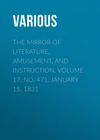Читать книгу: «The Mirror of Literature, Amusement, and Instruction. Volume 17, No. 471, January 15, 1831», страница 3
My story, however, had arrived there before me; and I must do my friends the justice to say, that all that kindness could do for me, under the circumstances, was done. Two or three times, indeed, Mark looked at me full in the face, and laughed outright, without any apparent cause for such a manifestation of mirth; and once when, after a few glasses of wine, I had almost ceased to think of the fate that awaited me, Miss Adelaide suddenly inquired, "Do you really start at five?—isn't that rather early?"—"Rather," replied I, with all the composure I could assume. But for a smile, and a sly look at her papa, I might have attributed the distressing question to thoughtlessness, rather than a deliberate desire to inflict pain. To parody a well-known line, I may say that, upon the whole—
"To me this Twelfth-night was no night of mirth."
Before twelve o'clock, I left a pleasant circle, revelling in all the delights of Twelfth-cake, pam-loo, king-and-queen, and forfeits, to pack my portmanteau,
"And inly ruminate the morning's danger!"
The individual who, at this time, so ably filled the important office of "Boots," at the hotel, was a character. Be it remembered that, in his youth, he had been discharged from his place for omitting to call a gentleman, who was to go by one of the morning coaches, and who, thereby, missed his journey. This misfortune made a lasting impression on the intelligent mind of Mr. Boots.
"Boots," said I in a mournful tone, "you must call me at four o'clock."
"Do'ee want to get up, zur?" inquired he, with a broad Somersetshire twang.
"Want indeed! no; but I must."
"Well, zur, I'll carl 'ee; but will 'ee get up when I do carl?"
"Why, to be sure I will."
"That be all very well to zay over-night, zur; but it bean't at all the zame thing when marnen do come. I knoa that of old, zur. Gemmen doan't like it, zur, when the time do come—that I tell 'ee."
"Like it! who imagines they should?"
"Well, zur, if you be as sure to get up as I be to carl 'ee, you'll not knoa what two minutes arter vore means in your bed. Sure as ever clock strikes, I'll have 'ee out, dang'd if I doan't! Good night, zur;" and exit Boots.
"And now I'll pack my portmanteau."
It was a bitter cold night, and my bed-room fire had gone out. Except the rush-candle, in a pierced tin box, I had nothing to cheer the gloom of a very large apartment—the walls of which (now dotted all over by the melancholy rays of the rush-light, as they struggled through the holes of the box) were of dark-brown wainscoat—but one solitary wax taper. There lay coats, trousers, linen, books, papers, dressing-materials, in dire confusion, about the room. In despair I set me down at the foot of the bed, and contemplated the chaos around me. My energies were paralyzed by the scene. Had it been to gain a kingdom, I could not have thrown a glove into the portmanteau; so, resolving to defer the packing till the morrow, I got into bed.
My slumbers were fitful—disturbed. Horrible dreams assailed me. Series of watches, each pointing to the hour of FOUR, passed slowly before me—then, time-pieces—dials, of a larger size—and at last, enormous steeple-clocks, all pointing to FOUR, FOUR, FOUR. "A change came o'er the spirit of my dream," and endless processions of watchmen moved along, each mournfully dinning in my ears, "Past four o'clock." At length I was attacked by night-mare. Methought I was an hourglass—old Father Time bestrode me—he pressed upon me with unendurable weight—fearfully and threateningly did wave his scythe above my head—he grinned at me, struck three blows, audible blows, with the handle of his scythe, on my breast, stooped his huge head, and shrieked in my ear—
"Vore o'clock, zur; I zay it be vore o'clock."
"Well, I hear you."
"But I doan't hear you. Vore o'clock, zur."
"Very well, very well, that'll do."
"Beggin' your pardon, but it woan't do, zur. 'Ee must get up—past vore zur."
"The devil take you! will you—"
"If you please, zur; but 'ee must get up. It be a good deal past vore—no use for 'ee to grumble, zur; nobody do like gettin' up at vore o'clock as can help it; but 'ee toald I to carl 'ee, and it bean't my duty to go till I hear 'ee stirrin' about the room. Good deal past vore, 'tis I assure 'ee, zur." And here he thundered away at the door; nor did he cease knocking till I was fairly up, and had shown myself to him, in order to satisfy him of the fact. "That'll do, zur; 'ee toald I to carl 'ee, and I hope I ha' carld 'ee properly."
I lit my taper at the rush-light. On opening a window-shutter I was regaled with the sight of a fog, which London itself, on one of its most perfect November days, could scarcely have excelled. A dirty, drizzling rain was falling; my heart sank within me. It was now twenty minutes past four. I was master of no more than forty disposable minutes, and, in that brief space, what had I not to do! The duties of the toilet were indispensable—the portmanteau must be packed—and, run as fast as I might, I could not get to the coach-office in less than ten minutes. Hot water was a luxury not to be procured: at that villanous hour not a human being in the house (nor, do I believe, in the universe entire), had risen—my unfortunate self, and my companion in wretchedness, poor Boots, excepted. The water in the jug was frozen; but, by dint of hammering upon it with the handle of the poker, I succeeded in enticing out about as much as would have filled a tea-cup. Two towels, which had been left wet in the room, were standing on a chair bolt upright, as stiff as the poker itself, which you might, almost as easily, have bent. The tooth-brushes were rivetted to the glass, of which (in my haste to disengage them from their strong hold) they carried away a fragment; the soap was cemented to the dish; my shaving-brush was a mass of ice. In shape more appalling Discomfort had never appeared on earth. I approached the looking-glass. Even had all the materials for the operation been tolerably thawed, it was impossible to use a razor by such a light.—"Who's there?"
"Now, if 'ee please, zur; no time to lose; only twenty-vive minutes to vive."
I lost my self-possession—I have often wondered that morning did not unsettle my mind!
There was no time for the performance of any thing like a comfortable toilet. I resolved therefore to defer it altogether till the coach should stop to breakfast.
"I'll pack my portmanteau: that must be done." In went whatever happened to come first to hand. In my haste, I had thrust in, amongst my own things, one of mine host's frozen towels. Every thing must come out again. "Who's there?"
"Now, zur; 'ee'll be too late, zur!"
"Coming!"—Every thing was now gathered together;—the portmanteau would not lock. No matter, it must be content to travel to town in a deshabille of straps. Where were my boots? In my hurry, I had packed away both pair. It was impossible to travel to London, on such a day, in slippers. Again was every thing to be undone.
"Now, zur, coach be going."
The most unpleasant part of the ceremony of hanging (scarcely excepting the closing act) must be the hourly notice given to the culprit, of the exact length of time he has yet to live. Could any circumstance have added much to the miseries of my situation, most assuredly it would have been those unfeeling reminders. "I'm coming," groaned I; "I have only to pull on my boots." They were both left-footed! Then must I open the rascally portmanteau again.
"What in the name of the—do you want now."
"Coach be gone, please zur."
"Gone! Is there a chance of my overtaking it?"
"Bless 'ee, noa, zur; not as Jem Robbins do droive. He be vive mile off be now."
"You are certain of that?"
"I warrant 'ee, zur."
At this assurance I felt a throb of joy, which was almost a compensation for all my sufferings past. "Boots," said I, "you are a kind-hearted creature, and I will give you an additional half-crown. Let the house be kept perfectly quiet, and desire the chambermaid to call me—"
"At what o'clock, zur?"
"This day three months, at the earliest."
P—.
New Monthly Magazine.
* * * A welcome re-action seems to have taken place in the conduct of the New Monthly Magazine. The present is an auspicious New-year's Number. It is, moreover, embellished with a fine Bust Engraving of Sir Walter Scott, Bart.
THE PENITENT'S RETURN
By Mrs. Hemans
Can guilt or misery ever enter here?
All! no, the spirit of domestic peace,
Though calm and gentle as the brooding dove,
And ever murmuring forth a quiet song,
Guards, powerful as the sword of Cherubim,
The hallow'd Porch. She hath a heavenly smile,
That sinks into the sullen soul of vice,
And wins him o'er to virtue.
WILSON.
My father's house once more,
In its own moonlight beauty! Yet around,
Something, amidst the dewy calm profound,
Broods, never mark'd before.
Is it the brooding night?
Is it the shivery creeping on the air,
That makes the home, so tranquil and so fair,
O'erwhelming to my sight?
All solemnized it seems,
And still'd and darken'd in each time-worn hue,
Since the rich clustering roses met my view,
As now, by starry gleams.
And this high elm, where last
I stood and linger'd—where my sisters made
Our mother's bower—I deem'd not that it cast
So far and dark a shade.
How spirit-like a tone
Sighs through yon tree! My father's place was was there
At evening-hours, while soft winds waved his hair:
Now those grey locks are gone.
My soul grows faint with fear,—
Even as if angel-steps had mark'd the sod.
I tremble where I move—the voice of God
Is in the foliage here.
Is it indeed the night
That makes my home so awful? Faithless hearted!
'Tis that from thine own bosom hath departed
The in-born gladdening light.
No outward thing is changed;
Only the joy of purity is fled,
And, long from Nature's melodies estranged,
Thou hear'st their tones with dread.
Therefore, the calm abode
By thy dark spirit is o'erhung with shade,
And, therefore, in the leaves, the voice of God
Makes thy sick heart afraid.
The night-flowers round that door
Still breathe pure fragrance on the untainted air;
Thou, thou alone, art worthy now no more
To pass, and rest thee there.
And must I turn away?
Hark, hark!—it is my mother's voice I hear,
Sadder than once it seem'd—yet soft and clear—
Doth she not seem to pray?
My name!—I caught the sound!
Oh! blessed tone of love—the deep, the mild—
Mother, my mother! Now receive thy child,
Take back the Lost and Found!
Blackwood's Magazine.

AUBERGE ON THE GRIMSEL.





















